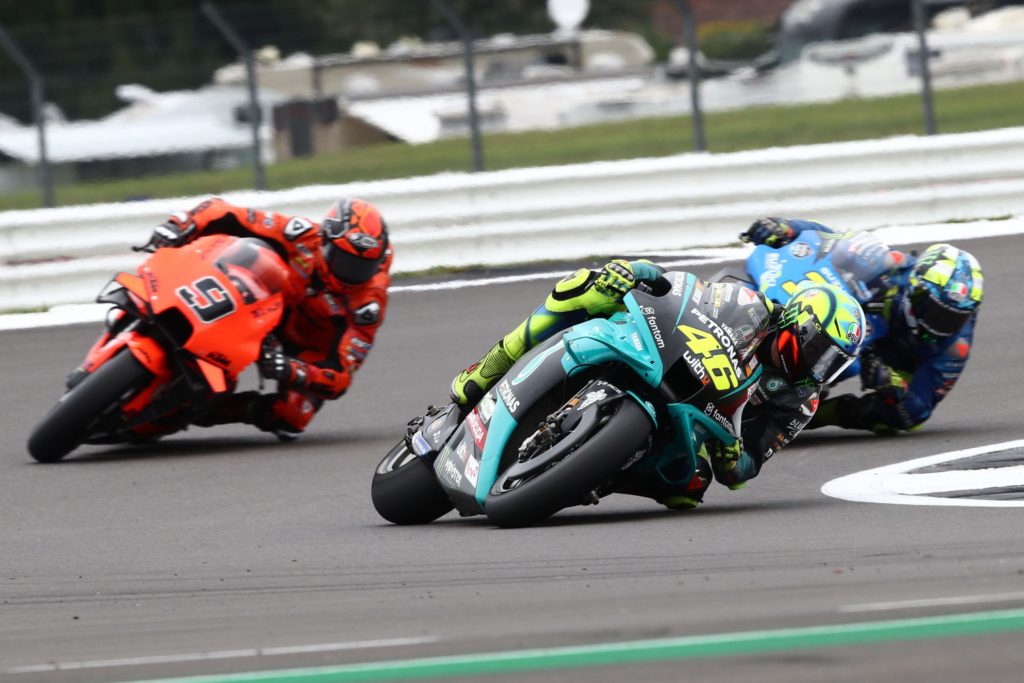MotoGP Slang Explained
Every sport has its distinct lingo and slang. Professional sportsmen and teams use these to converse among themselves. What is disconcerting to a new fan of a sport is that commentators frequently use these terms too. A fan may hear them when a television commentator interviews a sportsperson. Not knowing these slang/jargon slows down the process of interpreting and understanding the sport.
MotoGP, being a tech-heavy sport, also has its own lingo/jargon. Many of these words and phrases are used in other forms of motorcycle racing also. This article will list most of the slang used in MotoGP in alphabetical order. The aim is to enable new MotoGP fans to understand what the commentators are trying to convey to them. This will speed up the process of grasping what is going on during a race weekend faster than otherwise.
SEE ALSO: MotoGP vs Moto2: What’s The Difference?

- Apex
Apex is the closest inside of a corner where a rider feels free to ease the steering lock. It is at the apex that the rider concentrates on exiting the corner at maximum speed.
- Aero-body
There are four aero bodies in a MotoGP bike. They are the front fairing and the wings, rear-wheel which includes the spoon and the mudguards. The remaining two are front forks & front mudguards and the bike seat unit.
Each rider is allowed new aerodynamic packages for each year and one upgrade at any time through the season.
- Airbags
Airbags are fitted in every MotoGP rider’s suit and are mandatory. These airbags inflate when a bike crashes or a motorcycle comes to a sudden stop. These airbags are at the top of the suit and protect the rider’s collar bones and chest.
- Backing it in
This phrase is used when describing a rider’s using the back brake to let the rear wheel skid. This strategy is used when entering into a corner to align the bike in the right position to take off from the apex.
- Behind the bubble
Behind the bubble describes the rider’s crouching position on the bike to provide the least resistance to air. This position, when the rider tries to make himself as small as possible, is adopted mostly on the straights.
- Biting the screen
When a rider is giving it his all and pushing the bike to its limit he is said to be biting the screen.
- Brake disc
A brake disc is that part of the wheel assembly that rotates with the wheel. Brake pads are pressed against the brake disk to slow the bike down or bring it to a stop.
- Box
Box is a term used to instruct the rider to pit at the next possible chance. These instructions are given either on pit boards or dashboards.
- Cold tyres
MotoGP riders hot tyres to get a proper grip on the track lest the bike skids when braking. Cold tyres refer to tyres that have less grip and performance which could lead to a crash.
- Dry Race
The term dry race is used to describe a race on a dry track. It means that the race will be interrupted with red flags if it rains.
- ECU
The Electronic Control Unit mounted on every MotoGP bike is called an ECU for short. The ECU controls various parameters like traction control, skidding, wheelie control, engine braking and more. Teams are allowed to change the setting to their liking.
- Fairings
The outer brightly coloured shell of the bike is called fairing. Sponsors’ logos and team colours are displayed on the fairings.
- Flag-to-flag
This situation arises when it starts raining in a dry race. It will signal to the riders to go to the pitlane and switch to a bike with wet tyres and different settings. This signal is also displayed when a wet track dries out.
- Grid
It is the area before the starting line where the riders line up before the race begins. Riders line up three to a row in the order that is decided in the qualifying before the race.
- Highside
This is a situation when the rider’s rear-wheel skids out before it finds a grip. When the wheel finds the grip, the bike whips back in toward the outside throwing the rider over the top. A highside most often results in a crash.
- Holeshot
A holeshot is a rider that takes the lead going into the first corner and leads the field when he comes out of it.
- Kerb
Kerbs are often used on either side of corners to guide riders around the corner. Painted in two colours, kerbs are a prominent feature on corners.
- Lean angle
It is the angle at which riders lean their motorcycles while taking corners. At times the knees and even ankles brush against the track.
- Leathers
The protection suit that the riders wear, is referred to as leathers by riders and teams. The airbags are fitted in the top portion of leathers.
- Lowside
Whereas in a highside the rear tyre gets a grip and whips the bike back, in a lowside the rear tyre continues to slip and leads to the rider crashing.
- Parc Fermé
Parc Fermé translates to a closed park in French. It is an enclosed area where the top three finishers in qualifying and races gather with their bikes.
- Pitlane
The area adjacent to the race track where the garages of all riders are located is called pitlanes. Pit lanes are usually located along the start-finish straights. It is a place where riders come to change tyres, refuel and adjust settings among other things between sessions.
- Pull the pin
This phrase is used to describe when a rider tries everything in his power to take a sizeable lead of a pack. This event usually takes place in the front when riders are concentrating on saving their tyres. A rider may feel that he has had enough, pull the pin and try to get well ahead of the field.
- Race Director
The Race Director is the one who ensures that all sessions are races are run according to MotoGP rules and regulations. His job is to ensure that every rider is safe as possible. He is also responsible to decide what type of race it is going to be: dry or wet. Mark Webb is the current Race director of MotoGP
- Safety car
A safety car, as its name suggests, is a car that urgent medical attention to riders in case of an incident. A safety car will follow the riders around for the first lap before pulling into the pitlane. The safety car will also head out to inspect the track condition when necessary.
- Satellite team/rider
Now referred to as Independent Teams/riders, satellite teams/riders are distinguished from factory teams. These teams/riders lease bikes from their factories for a season of MotoGP racing. Gresini Racing MotoGP, Pramac Racing, WithU Yamaha RNF MotoGP Team are some of the independent teams. Tech3 KTM, LCR Honda Castrol/Idemitsu are the other satellite teams.
- Sighting lap
It is the lap that riders leave the pitlane and take before the start of a race.
- Slicks
Slicks are bald tyres used in used to race in dry weather. These tyres are smooth on the surface and do not have grooves. Slicks give a better grip on the track than grooved tyres which are used in wet conditions.
- Slipstream
Slipstream is the narrow corridor immediately behind a rider. The first rider brakes the air providing lower resistance to the rider following him closely. This makes it easier for the rider to follow the first rider closely and overtake him at an opportune moment.
- Spec
Spec is commonly used as short for specification. Spec defines the quality of the motorcycle a rider rides. Factory-spec is considered the highest quality of motorcycle produced to factory standards. A-spec and B-spec may use slightly older components or parts.
- Stoppie
Stoppie is just the opposite of a wheelie. While in a wheelie the front wheel comes off the ground, in a stoppie the rear wheel comes off the ground.
- Swingarm
A swing arm is the component of the bike that attaches the rear wheel of the bike to its frame.
- Tank Slapper
A tank slapper is a violent wobbling of the bike. In a tank slapper, a rider’s legs and arms slap against the bike’s tank giving rise to the term.
- Tear off
A rider has several layers of tear-offs on the visor of his safety helmet. The visor gets dirty due to the dirt and grit during a session obscuring the rider’s vision, The rider can simply tear off the topmost layer of the tear-offs to clear his vision.
- Telemetry
Telemetry is the data gathered by the many sensors mounted on the bike. This data is later analysed and appropriate settings are made to the engineer’s and rider’s satisfaction.
- TC
TC is short for traction control and is controlled by the ECU. The ECU measures the rpm at which the rear wheel rotates. If it rotates too fast and slips the rider is liable to crash. The ECU senses the tyre slipping and reduces the power of the engine to slow the rear wheel down. TC prevents a lot of crashes in MotoGP.
- Track Limits
Track limits define the limits of the track that riders cannot breach. The lap times of riders that breach the track limits are disqualified. The green areas on the outside of tracks cannot be used to gain an advantage. If a rider does that he is likely to be penalised by the Race Director.
- Trail Braking
Whenever a rider breaks going into a corner and getting a lean angle on his bike he is said to be trail braking.
- Tucked the front
This is a term used to describe a rider’s action when his front wheel has given way under him. Many a time when a rider enters or is at the apex, the front wheel loses traction and gives way. This very often leads to a crash. Very few riders are skilful enough to avoid crashing the bike.
- Visor
It is that part of the helmet that protects the rider’s eyes yet gives him a clear vision. The visor has several layers of tear-offs on it. Riders opt for different types of visors for different conditions. Sunny weather may prompt a rider to opt for tinted visors while in cloudy weather the rider might go with a clear visor.
- Warmup lap
It is the lap that riders take just before the race begins. During the warm-up, lap riders try to warm up their tyres to the right temperature. This sets them up for the upcoming race.
- Wet race
The race director will declare a wet race if the track is wet or it is raining. Riders then switch on to bikes mounted with wet tyres.
- Wheelie
The condition when the bike rides on only the rear wheel and the front wheel is in the air is known as a wheelie. This sometimes happens when riders are accelerating in a MotoGP. Riders often show off after the race with wheelies.
- Wildcard
A rider competing in a one-off race is called a wid card. He is also called a wild card entry.
Conclusion: MotoGP Slang Explained
The above are some of the slang used in MotoGP quite often. Coming to grips with the terms will help new fans understand MotoGP faster and better.
